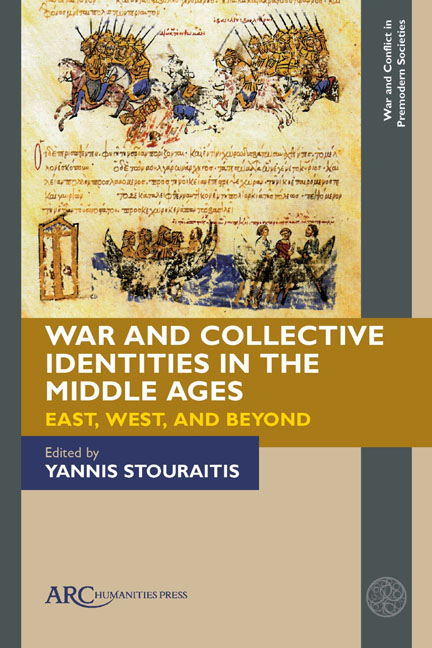Book contents
- Frontmatter
- Contents
- Notes on Contributors
- Chapter 1 War and Peoplehood in the Middle Ages: An Introduction
- Chapter 2 War and Peoplehood through Time: A Sociological Longue Durée Perspective
- Chapter 3 Making War Ethnic: Arab– Persian Identities and Conflict on the Euphrates Frontier
- Chapter 4 Captive Identities: Inscribing Armenianness from Sebēos to Ayrivanec‘i
- Chapter 5 War and Identity in Early Medieval Bulgaria
- Chapter 6 Collective Identifications in Byzantine Civil Wars
- Chapter 7 Warfare and Peoplehood: The Vikings and the English
- Chapter 8 Medieval European Civil Wars: Local and Proto-national Identities of Toulousains, Parisians, and Prague Czechs
- Chapter 9 The Crusades and French Political Identity in the Thirteenth-Century Mediterranean
- Chapter 10 The Song– Jurchen Conflict in Chinese Intellectual History
- Chapter 11 Faithful to a Vanishing Past: Narrating Warfare and Peoplehood in Yuan China
- Chapter 12 War and Collective Identifications in Medieval Societies: Drawing Comparisons
- Selected Bibliography
- Index
Chapter 10 - The Song– Jurchen Conflict in Chinese Intellectual History
Published online by Cambridge University Press: 28 December 2023
- Frontmatter
- Contents
- Notes on Contributors
- Chapter 1 War and Peoplehood in the Middle Ages: An Introduction
- Chapter 2 War and Peoplehood through Time: A Sociological Longue Durée Perspective
- Chapter 3 Making War Ethnic: Arab– Persian Identities and Conflict on the Euphrates Frontier
- Chapter 4 Captive Identities: Inscribing Armenianness from Sebēos to Ayrivanec‘i
- Chapter 5 War and Identity in Early Medieval Bulgaria
- Chapter 6 Collective Identifications in Byzantine Civil Wars
- Chapter 7 Warfare and Peoplehood: The Vikings and the English
- Chapter 8 Medieval European Civil Wars: Local and Proto-national Identities of Toulousains, Parisians, and Prague Czechs
- Chapter 9 The Crusades and French Political Identity in the Thirteenth-Century Mediterranean
- Chapter 10 The Song– Jurchen Conflict in Chinese Intellectual History
- Chapter 11 Faithful to a Vanishing Past: Narrating Warfare and Peoplehood in Yuan China
- Chapter 12 War and Collective Identifications in Medieval Societies: Drawing Comparisons
- Selected Bibliography
- Index
Summary
IN 1120, THE Chinese Song dynasty negotiated an alliance with the Jurchen people of Manchuria, who had lately achieved remarkable military success in a revolt against their overlords, the Inner Mongolian Kitans (or Khitans).* The Song had enjoyed more than a century of peace with the Kitan Liao empire since 1005. But that peace rested on a treaty that required the Song to pay an annual indemnity of silk and silver to the Liao and renounce its claim to the strategic Yan-Yun region on its northern border, which a previous dynasty had ceded to the Liao in exchange for military aid in 938. A hawkish, irredentist segment of the Song literati elite had always resented the loss of Yan-Yun. Although a majority of ministers at the Song imperial court felt that war with the Liao was too risky, the chief minister Wang Fu (1079– 1126) and the eunuch general Tong Guan (1054– 1126) finally convinced emperor Zhao Ji (posthumously Huizong, r. 1100– 1126) that the Jurchen revolt was a heaven-sent opportunity to recover Yan-Yun.
Under the Song– Jurchen alliance's terms, the Song undertook to capture the Liao empire's Southern capital (Yan, modern Beijing) while the Jurchens overran the Kitan heartland in eastern Inner Mongolia and took the Western capital (Yun, modern Datong). Once the war was over, the Jurchens’ new Jin empire would recognize Song possession of the Yan region (northern Hebei) in return for receiving the same annual indemnity once made to the Liao: 300,000 bolts of silk and 200,000 ounces of silver. The question of who would get the Yun region (northern Shanxi) was left somewhat open, to be subject to further negotiation. It seemed like a relatively good deal for the Song, but things started going wrong almost immediately. A large rebellion broke out in southeast China in late 1120, delaying the planned Song invasion of Yan until late 1122. By that time, the Jurchens had already conquered all four of the Liao empire's other capitals, including Yun. Next, the Song army badly bungled its assault on the Southern capital, only to see its defenders surrender to a Jurchen army shortly afterwards.
The Song had clearly failed to fulfill its part of the alliance agreement. Nonetheless, under a new Song– Jin treaty concluded in 1123, the Jurchens grudgingly agreed to hand over the entire Yan-Yun region in exchange for financial compensation.
- Type
- Chapter
- Information
- War and Collective Identities in the Middle AgesEast, West, and Beyond, pp. 169 - 190Publisher: Amsterdam University PressPrint publication year: 2023

